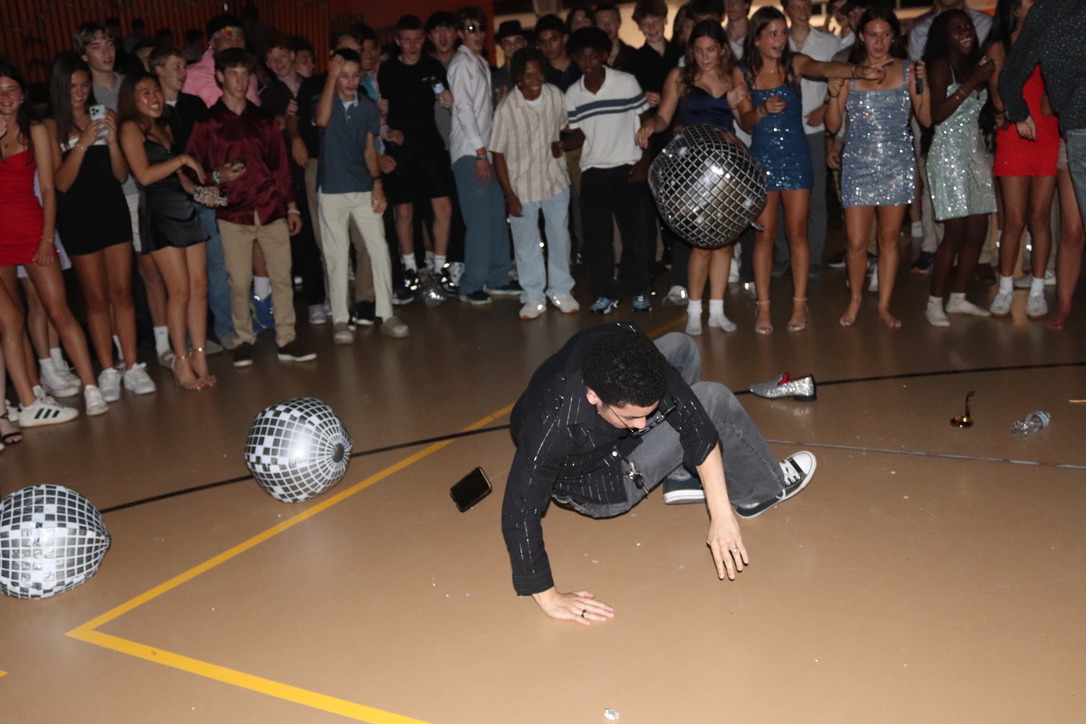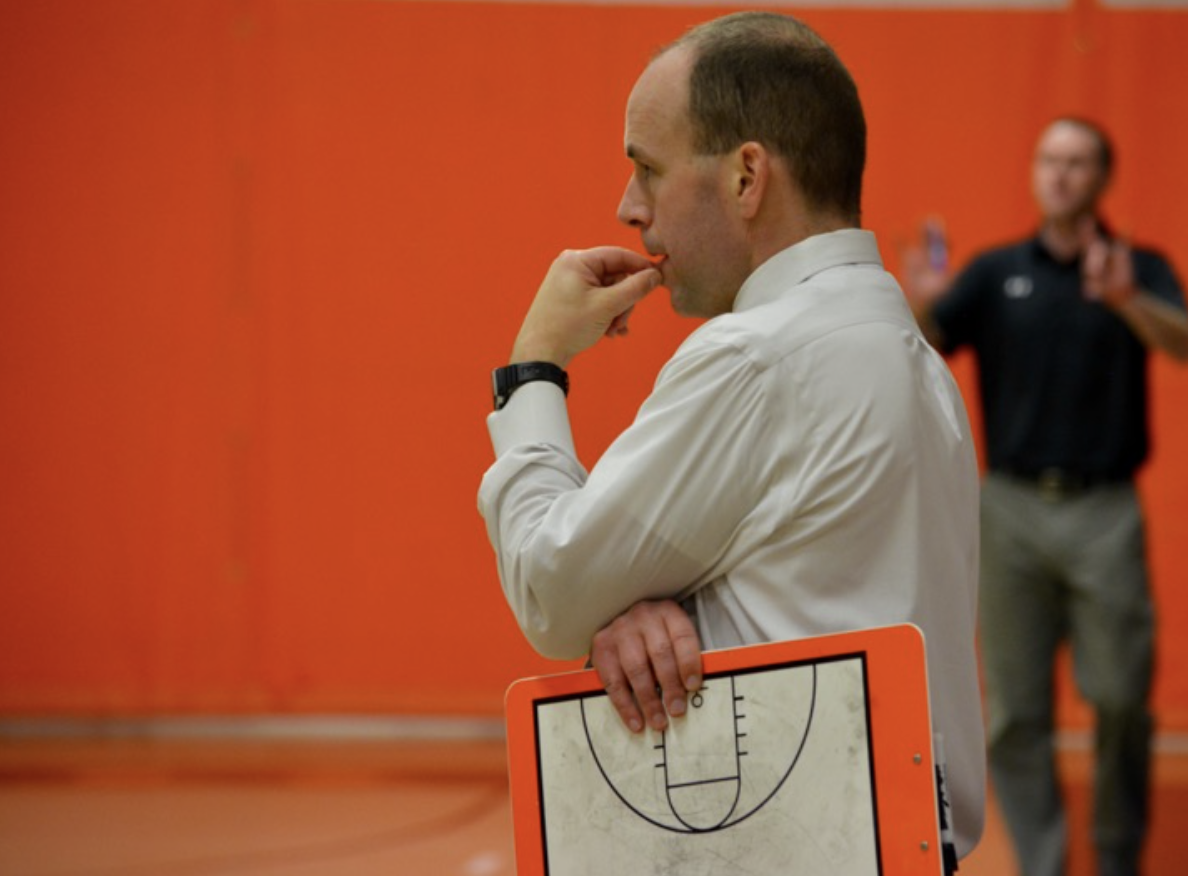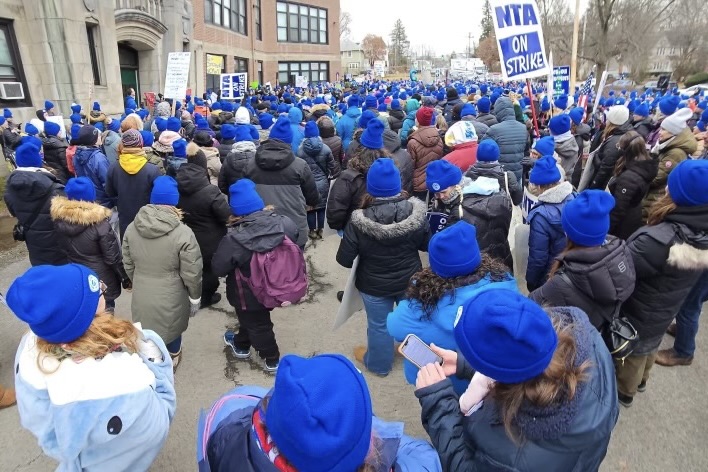From Jan. 19 to Feb. 2, teachers from all schools in the Newton School District (NSD) in Massachusetts demonstrated for a renewed and modified contract, marking the longest teachers strike in recent decades. After 11 days of canceled classes, on Friday, Feb. 2, the Newton School Committee stated that they had reached a “tentative agreement on a new four-year contract” with the Newton Teachers Association (NTA).
For some NTA members, the new contract is a bittersweet victory after 16 months of negotiations. Additionally, for some students, the strike was a source of stress and uncertainty because they were not able to attend school for an extended period of time. Now that the strike has ended and school has resumed in Newton, students and staff have had time to reflect on the recent events.
Yet, some Newton teachers expressed that the “recent events” of January and February were the culmination of negotiations with the School Committee that seemed to yield no progress. Negotiations between the NTA and the School Committee began in October of 2022, and the contract for Newton teachers expired in August of 2023, meaning teachers worked without a contract for over five months.
During the negotiation process before the strike, Newton North High School (NNHS) special education teacher Brian Rooney attended School Committee meetings as a silent representative. According to Rooney, the little-to-no headway made during mediation sessions was concerning.
“Seeing how little was happening over the course of that mediation process [brought about the] concern of many of my colleagues [that] a contract could be forced upon us,” Rooney said.
The NTA had some key issues that were important to its members that they wanted a new contract to address. Among these issues was the topic of pay for special education aides and therapists, or “Unit C” members. Currently, Unit C employees in Newton make roughly $27,000 a year. Rooney, who has worked alongside many Unit C employees, believes that for the support these aides and therapists provide to students, an increased wage is necessary. Advocating for Unit C members was the primary reason Rooney joined the strike.
“I understand extremely well the impact [special education aides and behavior therapists] make both in the lives of students and in the lives of the teachers whose classrooms they support,” Rooney said. “I wanted them to know and to understand and see how much I valued them [and] what they bring to our school. I was going to make that my focus of trying to help them earn a wage that can then be a wage that they could live on without having to get additional jobs.”
Another issue important to some NTA members was parental leave. In the former contract, teachers were granted 60 schools days of parental leave. Some NTA members were worried that in a new contract this number of parental leave days was going to decrease.
For NNHS chemistry teacher Sangeet Srikanth, parental leave was the main reason she joined the strike. When Srikanth had her first child while living in India, she had 26 weeks of parental leave. However, when she had her second child in America, the number of parental leave weeks dropped to 12. The 60 school days of parental leave that teachers in Newton had equates to 12 weeks. According to Srikanth, when she heard that the previous 12 weeks of parental leave could decrease even further, she and her colleagues felt they had to shed light on the issue.
“It is emotionally very traumatizing for a new parent, for a mother, to leave a not even 12-week-old child with someone else and go to work eight hours a day,” Srikanth said. “A lot of teachers at different press conferences and rallies spoke about their experience with parental leave and how they had a difficult time going back.”
NSD is not the only school system that recently negotiated for a new contract. During a period of the 2022-2023 school year, the Wayland Teacher Association (WTA) demonstrated for new contracts every Wednesday morning before school. WHS math teacher and WTA member Charlene Bishop led negotiations with the School Committee over Wayland teacher contracts. A new Wayland teachers contract was ratified the summer before the 2023-2024 school year and Wayland residents formally voted to transfer funds to Wayland teacher contracts in December of 2023..
“The contracts are important because it’s how we define our rights as employees, and it really only gets renewed every three years,” Bishop said. “I mean, you can amend [the contracts], but [substantial change] is really what happens [every] three years.”
Both Rooney and Bishop agree that the negotiations process can become prolonged, which can lead to frustration. Despite this, Rooney says that the idea of going on strike was never in the cards and was a last resort. However, sentiment among the NTA members changed when they realized that they were not seeing their needs met in negotiations.
“If we had seen that both sides were trying to come to some middle ground, then [the strike] would have never happened,” Rooney said. “The school community said ‘sorry, this is all the money we have.’ The mayor didn’t want to get involved in any way. It just felt like they were going to try to drag the process out, [and] force their last best offer on us. And so at that point, that kind of left us with very little options, so we’ve sort of felt forced into it.”
98% of teachers demonstrated outside Newton town buildings each day of the strike. Srikanth and Rooney believe that the time during the strike was stressful for teachers and students, but when the strike ended and school resumed, the stressful environment of uncertainty was replaced with relief for some students and teachers.
“I think as we saw each other [at school] again, there was joy, there was relief,” Rooney said. “There was an excitement that we were back in the building.”
In the days preceding the strike, Newton South High School (NSHS) senior Ameer Almedhychy knew that something was going to happen. He said that in the days leading up to the strike, his teachers explained that there was going to be a “teacher snow day.” However, the teachers were careful to never use the word “strike.” As a result, Almedhychy and his classmates knew that something was going to happen, but not to what extent. They thought that they were going to miss school for three days and return the following Wednesday.
“The teachers have been working without a contract since August, so since the start of the school year, [and] why would you work without a contract?” Almedhychy said. “There has been tension brewing for so long, and the bottle has to explode at some point and it did two weeks ago.”
On Monday, Feb. 5, all NPS employees and students returned to school with a one-hour delay to their normal start time. At NSHS, teachers lined every single entrance of the school and warmly welcomed the students back. They clapped and shouted, “we miss you,” and prepared and distributed about 3,000 muffins to students as they walked back into the high school and waited at their bus stops.
“[When] we all walked in [to class], all the teachers said ‘do you have any questions, now that we can speak more freely about what happened?’” Almedhychy said. “In [our] history classes and World Language classes, we’ve had restorative circles, as they call it. That’s how the teachers have addressed what happened.”
Since Almedhychy is a senior and has been in the process of applying to colleges since the start of the school year, the timing of the strike, which occurred right at the end of quarter two, caused delays in his application.
“Our principal wrote a letter and sent it to every single college that [NSHS seniors] applied to, saying, ‘these are the current circumstances in Newton, please know that term two grades will be delayed,’” Almedhychy said. “[Colleges] were actually very flexible about it, even the international schools.”
Overall, Almedhychy found that despite the circumstances, all of his teachers were extremely flexible and accommodating. His Advanced Placement (AP) teachers assured students that they were well ahead of schedule, and that they would still have adequate time to review for the AP test after learning all of the material. Almedhychy also submitted a bonus recommendation for his college application, and one of his teachers helped him edit it.
“Now, AP teachers are actually trying to negotiate makeup days so they [can] have all their students take the test on the makeup days instead of the regular testing days,” Almedhychy said.
To make up for the lost time, Newton pushed the last day of school to the latest day they can for underclassmen: June 28. The school district also canceled February break, which occurs this year from February 20 to February 30 for most Massachusetts public schools. However, according to Almedhychy, his teachers encouraged those with vacation plans to go through with them, since they stated that having school during February break wouldn’t affect students’ attendance or grades. Teachers plan to be “very easy” during the week by doing a few activities like watching movies. They also promised that any work they did in class would also be able to be completed asynchronously.
“Most of the families and students support the teachers, an overwhelming majority, which was actually unexpected [since] we thought parents would get up in arms [because they were] upset that their children were not in school,” Almedhychy said. “But [everyone] realizes that [the problems the strike addressed] are important for the future of the district. A lot of us have siblings that will still go through the public school system, so it’s important that teachers are paid adequately and schools are funded well so that our siblings can also excel in [school] environments for the next few years. Don’t get me wrong, [the strike was] extremely disruptive, but important.”
For NSHS sophomore Maria Alves, the 11-day strike served as both a break from school and a stress-inducing time period.
“[The strike] was like a break for us,” Alves said. “It was good [on] one side, but [on the other] side, it was hard and stressful because you didn’t know when you were going to go back to school, and how much longer it was going to take [for the strike to end].”
Alves, along with three other students in her friend group, are applying to attend private schools during their junior year out of the fear that a similar situation will occur again. According to Alves, a similar strike could cause more disruption to their educational and athletic careers.
“I think it will happen again,” Alves said. “And I’m switching schools because of that. [After the strike], teachers are being less caring about their work. We’re having more breaks and [free time] during class.”
Despite the NTA’s success in negotiating for changes to their contract, Rooney reiterates that the strike was the Newton teachers’ last resort. Rooney hopes that other districts can learn from NPS’s situation and begin the process of negotiating for fair contracts from the get-go.
“I’m hopeful that this situation [in Newton] might inspire other districts and unions to negotiate from day-one more,” Rooney said. “[The strike] wasn’t easy. It wasn’t fun. I was blown away by the commitment of our union members to each other and to what we were fighting for.”

![During the WHS club fair, senior Molly Bergeron is watching a student sign up for her club, Eliza J. Norton Foundation. In this club, students meet every week and come up with ideas to spread the message. "[This club] really touches a lot of people in the town," Bergeron said.](https://waylandstudentpress.com/wp-content/uploads/2025/10/IMG_1335-1200x800.jpg)





























Citizen • Feb 17, 2024 at 12:24 PM
Well written and a different perspective presented in a balanced way